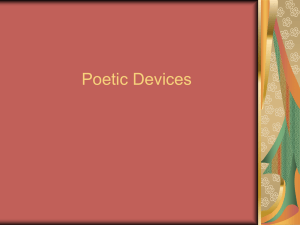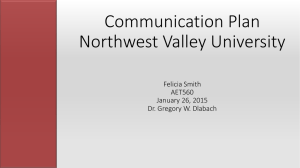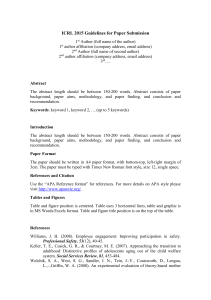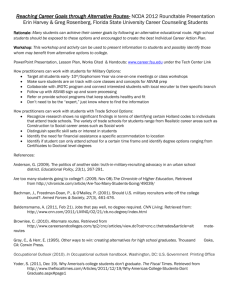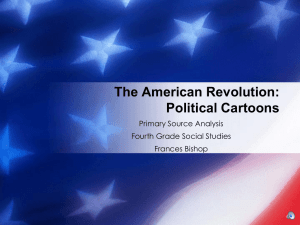- Mr. Storey
advertisement
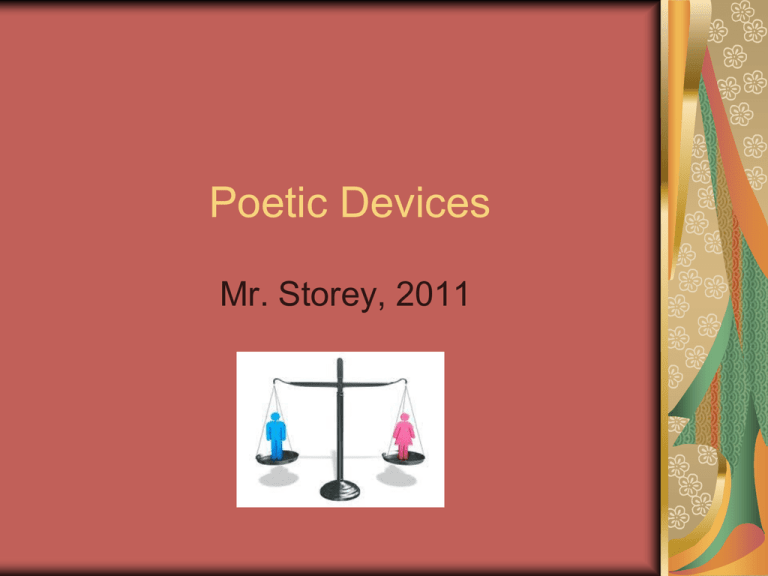
Poetic Devices Mr. Storey, 2011 Poetic Devices: What are they? Why are they so special? Poetic devices fit into the category of figurative language. They can DEFINITELY be used in more than JUST poetry. Click on the penguin to take a peek at a video clip on your first two poetic devices. Once you finishing watching the clip, close the media player to continue the PowerPoint. Simile A comparison of two things; uses the words “like” or “as”. Examples: My mind is like an open book. He sprinted as fast as a cheetah to the finish line. Buster barks like broken alarm clock. Click on the book to practice similes. Alliteration In a line, more than one word begins with the same consonant letter. Example: Busy Buzzing Bees Witches fly west in the winter. The savory smell of seasoned steak on the grill made my mouth salivate. Click on the witch to read more about alliteration. Metaphor Compares one thing to another by stating that something IS something else. Example: White gleaming stars are diamonds in the midnight sky. The snow is a white, fluffy blanket covering the field. Sam is King Kong when he’s mad. Click on the gorilla and complete the attached worksheet to practice metaphors. Personification Giving a nonhuman thing human characteristics. Examples: The bare branches grabbed me as I ran through the woods. The collie seemed to smile as his owner rubbed his ears. The popcorn jumped right out of the popping machine. Practice personification by clicking the collie. Onomatopoeia Words that sound like noises Examples: Boom! Crash! Quack! Moo! Shhh! Crackle! Click on the radio to read poems using onomatopoeia. Repetition When words, phrases, or entire lines of a poem are repeated. Usually words are repeated to help make a point or create a mood. Examples: Repeating one word (sometimes at the end of a line) Repeating a line (usually the last line of a stanza) Click on the moon to see more about repetition. Hyperbole Using exaggeration to make a point. Examples: I’m so hungry I could eat a whole chicken! It rained buckets during the game this morning. Megan was so mad fume rose from her head. Click on the football for a short clip on hyperboles and similes. Rhyme Words or phrases that end or sound like they end the same. Examples: Mop up that slop!! There goes the rabbit, Grab it!! Twinkle, twinkle little star, How I wonder what you are. Do not Hop on Pop! Click on the plate of spaghetti, read the nursery rhyme, and write down all the rhyming word pairs on your paper. Imagery Using descriptive language (five senses) to help paint a picture in the reader’s mind. Using Imagery is very similar to using “Show, Don’t tell” in writing. Instead of saying, “It was Halloween” or “The sunset was pretty”, we can describe the scene using imagery. Examples: Giggling and yelling, straw-filled scarecrows, pretty princesses, mean monsters, and other creatures paraded down the street with extended candy bags to welcoming porch lights in search of the best sweets. The girls gazed at the beautiful hues of fiery orange, lemon yellow, prom dress pink, and a splash of grape purple in the sunset over the horizon. Click on the candy to learn more about imagery and examples from songs. Let’s see them in action! Next, Let’s read some famous poems or nursery rhymes. What examples of similes, metaphors, alliteration, hyperboles, onomatopoeia, repetition, rhyme, and imagery do you find? Work in your groups to identify these poetic devices. Click on the picture, print your worksheet, and complete in your groups. References Buzzin: Learning Made Fun. (2004). Retrieved October 9, 2006, from Buzzin: http://www.buzzin.net/english/allit.htm Defining Imagery: Prediction. Maryland Technology Academy. (2000). Retrieved October 14,2006 from http://cte.jhu.edu/techacademy/web/2000/baczkowski/image def.htm Discovering Language Arts: Style, Structure, and Tone (Grades 3-5). Discovery Channel School (2005). Retrieved October 11, 2006, from unitedstreaming: http://www.unitedstreaming.com/ Discovering Language Arts: Fiction (Grades 3-5). Discovery Channel School. (2006). Retrieved October 11, 2006, from unitedstreaming: http://www.unitedstreaming.com/ Metaphors. RHL School—Free Learning Resources. (19962006). Retrieved October 3, 2006 from http://www.rhlschool.com/eng3n26.htm References Continued Onomatopoeia Poetry. Langley Schools, BC, Canada Homepage. (2006). Retrieved October 14, 2006 from http://www.sd35.bc.ca/lm/archive/div8sampleonomatop.htm On Top of Spaghetti. Just Playing: Nursery Rhymes and Silly Stuff. Retrieved October 14, 2006 from http://smartcentral.com/spaghetti.htm PoemHunter.com Retrieved October 10, 2006 from http://www.poemhunter.com Repetition Classics. Thinkquest.org. (2006). Retrieved October 14, 2006 from http://library.thinkquest.org/J0112392/repetitionclassics.html Shared Poetry Reading: Teaching Print Concepts, Rhyme, and Vocabulary. Read, Write, Think.org. (2006) Retrieved October 14, 2006 from http://www.readwritethink.org/lessons/lesson_view.asp?id=8 83
